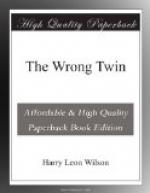It seemed to be so with a dozen of the boys he had come back with. Some of these were writing to him, wanting him to come here, to come there; to go on and on with them to inviting places they knew—and on again from there! Mining in South America, lumbering in the Northwest, ranching in the Southwest; one of his mates would be a sailor, and one would be with a circus. Something within him beyond reason goaded him to be up and off. He felt his hold slipping; his mind floated in an ecstasy of relaxation.
His first days at the Home Farm had been good-enough days. Sharon Whipple had told him a modern farmer must first be a mechanic, and he was already that—and no one had shot at him. But the novelty of approaching good machine-gun cover without apprehension had worn off.
“Ain’t getting cold feet, are you?” asked Sharon one day, observing him hang idly above an abused tractor with the far-off look in his eyes.
“Nothing like that,” he had protested almost too warmly. “No, sir; I’ll slog on right here.”
Now for the first time in all their years of association he saw an immense gulf between himself and Sharon Whipple. Sharon was an old man, turning to look back as he went down a narrow way into a hidden valley. But he—Wilbur Cowan—was climbing a long slope into new light. How could they touch? How could this old man hold him to become another old man on the same soil—when he could be up and off, a happy world romper like his father before him?
“Funny, funny, funny!” he said aloud, and lazily rolled over to stare into blue space.
Probably it was quite as funny out there. The people like himself on those other worlds would be the sport of confusing impulses, in the long run obeying some deeper instinct whose source was in the parent star dust, wandering or taking root in their own strange soils. But why not wander when the object of it all was so obscure, so apparently trivial? Enough others would submit to rule from the hidden source, take root like the willow—mate! That was another chain upon them. Women held them back from wandering. That was how they were tricked into the deadly home feeling his father warned him of.
“Funny, funny, funny!” he said again.
From an inner pocket he drew a sheet of note paper worn almost through at the fold, stained with the ooze of trenches and his own sweat. It had come deviously to him in the front line a month after his meeting with Patricia Whipple. In that time the strange verse had still run in his mind—a crown of stars, and under her feet the moon! The tumult of fighting had seemed to fix it there. He had rested on the memory of her and become fearless of death. But the time had changed so tremendously. He could hardly recall the verse, hardly recall that he had faced death or the strange girl.




